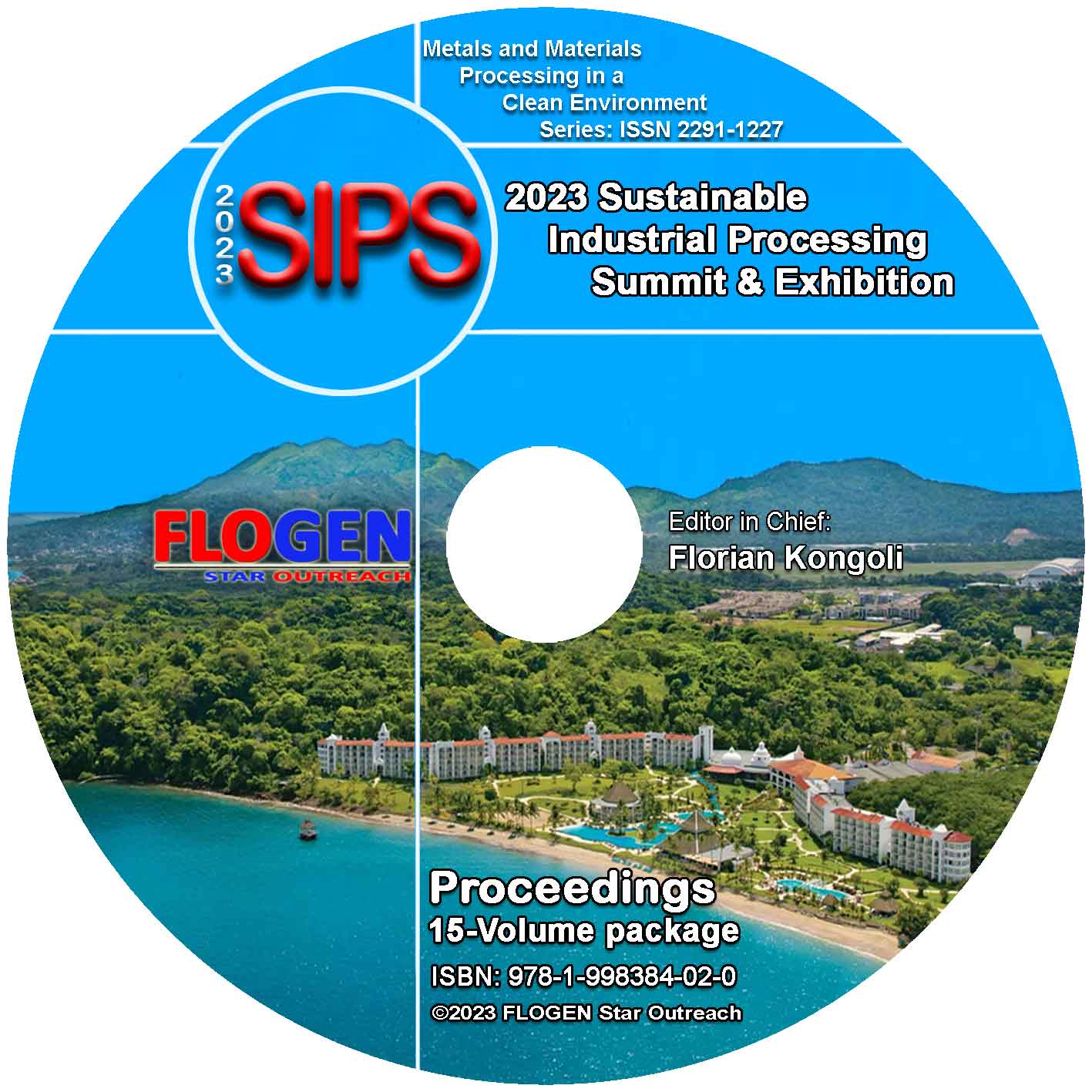2023-Sustainable Industrial Processing Summit
SIPS2023 Volume 15. Intl. Symp on Advanced Materials and Modelling of Complex Materials
| Editors: | F. Kongoli, F. Marquis, N. Chikhradze, T. Prikhna, O. Adiguzel, E. Aifantis, R. Das, P. Trovalusci |
| Publisher: | Flogen Star OUTREACH |
| Publication date: | 21 December 2023 |
| Pages: | 288 pages |
| ISBN: | 978-1-998384-00-6 (CD) |
| ISSN: | 2291-1227 (Metals and Materials Processing in a Clean Environment Series) |

CD shopping page
NATURAL BIOACTIVES FOR HUMAN AND PLANETARY HEALTH
Martin Kussmann1;1KERN AND KUSSMANN BIOTECH, Freising, Germany;
Type of Paper: Keynote
Id Paper: 284
Topic: 43
Abstract:
Bioactive compounds in edible plants and foods are vital for human and planetary health, yet their significance and potential remain underappreciated. These natural bioactives, as part of whole diets, ingredients, or supplements, can modulate multiple aspects of human health, wellness, and performance [1].Â
Recent advancements in omics, computational biology, and artificial intelligence, combined with the development of personalised [2] and precision nutrition [3], have catalysed the convergence of nutrition and medicine, and facilitated more efficient and affordable healthcare solutions that leverage the power of food for prevention and therapy.Â
Innovation in this field is crucial to feed a growing global population sustainably and healthily. This requires significant changes in our food system, spanning agriculture, production, distribution, and consumption [4]. As we are facing pressing population and planetary health challenges, investing in bioactive-based solutions is an opportunity to improve and sustain our health care systems, protect biodiversity and the health of our soils, waters, and atmosphere, while creating value for consumers, patients, communities, and stakeholders [5].Â
Translational research and innovation in the field of natural bioactives are currently being developed at two levels, using a systems-oriented approach: first, at biological level, the interplay between these compounds and the human host and microbiome is being elucidated through omics research [6], computational biology [7], and artificial intelligence [8], to accelerate both discovery and validation; second, at ecosystem level, efforts are focused on producing diverse, nutrient-rich, flavourful, and resilient, yet high-yield agricultural crops, and educating consumers to make informed choices that benefit both their health and the planet [4].Â
Adopting such systems perspective helps: unravel the relationships between bioactives, nutrition, and sustainability outcomes, harnessing the power of nature to promote human health and wellbeing; foster sustainable agriculture and protect the ecosystem [5]. Therefore, interdisciplinary and international collaboration is needed for a new era of science, research, and development of practical food-based solutions for some of the most pressing challenges of humanity in the Anthropocene [9].
Keywords:
Environment; New And Advanced Technology; Sustainable Development; nutrition; health; sustainability; bioactive; omics; artificial intelligenceReferences:
[1] Kussmann M; Bioactive Comp. Health Disease 2022, 5(10) 222-234: “Nature has the answers: discovering and validating natural bioactives for human healthâ€.[2] Kaput J, Pontes Monteiro J, Morine M, Kussmann M: „Personalised Nutrition“ in Elsevier’s Reference Collection in Biomedical Sciences 2022: “Comprehensive Precision Medicineâ€. Eds: Ramos K, Slikker W.
[3] Berciano Benitez S, Figueiredo J, Brisbois T, Alford S, Koecher K, Eckhouse S, Ciati R, Kussmann M, Ordovas JM, Stebbins K, Blumberg JB. Frontiers Nutrition 2022 (9) 979665: “Precision Nutrition: Maintaining Scientific Integrity and Realizing Market Potentialâ€.
[4] Kaput J, Kussmann M, Mendoza Y, Le Coutre R, Cooper K, Roulin A; Genes & Nutrition 2015 (10) 12: “Enabling nutrient security and sustainability through systems researchâ€.
[5] Kussmann M, Abe Cunha DH, Berciano Benitez S; Frontiers Nutrition 2023 (10) 1193848: “Bioactive compounds for human and planetary healthâ€.
[6] Andraos S, Wake M, Saffrey R, Burgner D, Kussmann M, O’Sullivan JM. Adv. Nutr. 2019 10(6) 944-952: “Perspective: Advancing Understanding of Population Nutrient–Health Relations via Metabolomics and Precision Phenotypesâ€.
[7] Michelini S, Balakrishnan B, Parolo S, Matone A, Mullaney J, Young W, Gasser O, Priami C, Lombardo R, Kussmann M. BMC Microbiol. 2018 (6) 171: â€A reverse metabolic approach to weaning: In silico identification of immune-beneficial infant gut bacteria, mining their metabolism for prebiotic feeds and sourcing these feeds in the natural product spaceâ€.
[8] Doherty A, Wall A, Khaldi N, Kussmann M. Frontiers Genetics 2021 (12) 768979: “Artificial Intelligence in functional food ingredient discovery and characterisation with a focus on bioactive plant and food peptidesâ€.
[9] Kussmann M, Hayek M, Berciano Benitez S; Frontiers Nutrition 2023 Research Topic: “Nutrition for humanity in the Anthropocene – for healthier people on a healthier planet†FrontiersNutrition2023 NutritionHumanityAnthropocene